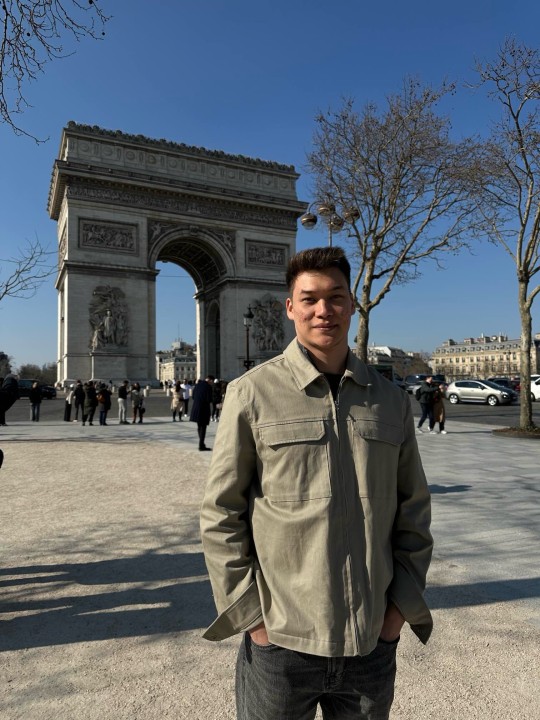HSBC is one of the biggest banks globally. In this article, we share how fellow Kazakhstanis are building their careers at HSBC and what advice they have for those just starting out.
Timur Agaltsov, 23, city — Hong Kong, Analyst, Banking, linkedin

About me and the company
I work at HSBC — a global bank with British roots and a strong presence in Asia, especially in Hong Kong, where it was originally founded. HSBC covers the full range of financial services — from retail banking to large-scale investments. Here, you truly feel the global scale: working on cross-border projects, interacting with international clients, and witnessing decision-making at country and market levels.
I’m a financial analyst on the Infrastructure Finance team. We fund major infrastructure projects like power plants, wind farms, and industrial facilities around the world. My responsibilities include analyzing credit risks and project documentation, assessing cash flow, modeling interest rates, and building optimal debt structures.
The most important thing in my role is the desire to learn and the readiness to take responsibility. In finance, every day is a chance to grow — if you embrace challenges and dive deep into the work. The technical skills can be learned on the job. But soft skills — building relationships and working in teams — are what really propel your career and open up exciting opportunities.
Career path
While studying in Hong Kong, I completed a summer internship at EY in Almaty — that’s when I realized I wanted to pursue a career in this industry. Hong Kong is one of the world’s major financial hubs, so after university, the choice was clear. In my third year, I applied for an internship at HSBC and went through four selection stages — from aptitude tests to a final team interview. In the end, I received a full-time offer and have now been working here for two years.
The hardest part for graduates is landing that first job. It takes a combination of factors — preparation, timing, and luck. It became even tougher after the pandemic — fewer roles, more competition. But the key is to keep going, not be afraid, and stay open to every opportunity.
Networking played a crucial role in my journey. I met with someone from the team every day, learning about their experiences and sharing my motivation. Over 10 weeks, I connected with more than 50 people — this helped me understand the company culture and present myself as a proactive candidate.
Adapting to a new environment
Adapting to life in Hong Kong was a smooth process. The key is to stay open, take initiative, and come to work eager to learn. The culture is more formal here, but the core values are similar — professionalism and team support are highly valued. One fun tradition: during Chinese New Year, colleagues exchange laisee — red envelopes with money, as a symbol of good luck. After successful deals and on holidays, we often celebrate with team dinners.

Workload at the bank varies — from relatively calm days to high-pressure periods. But HSBC values balance: they encourage rest and try not to overload employees unnecessarily. I still find time for family, friends, exercise, and wellness. HSBC also offers 24 days of vacation a year, and I consistently take time off a few times annually to recharge.
How to land a job at an international company
Many people don’t apply because they think they’re not good enough. Sometimes, you just have to try. It’s important to know why this company and this role interest you. Do your research beforehand — learn about the company’s values, projects, and culture. That knowledge will give you confidence and help you speak more thoughtfully.
Be very familiar with your resume: be ready to briefly walk through your past experience, projects, and what you’ve learned. Always prepare examples of situations where you tackled challenges, worked in a team, or managed stress — these questions come up in almost every interview.
Recommendations
Start by defining what you really want — what field and where you want to work. Then, focus heavily on networking. Reach out to people on LinkedIn, ask questions to those already working where you’d like to be. This gives you real insights and helps demonstrate your interest beyond the resume.
Pro tip: don’t ask for a job — ask for advice. People respond more openly, and the conversation becomes more genuine. A good piece of advice can sometimes open more doors than any CV.
Adilzhan Nussipzhan, 29, city — London, Software Engineer, linkedin
About me and the company
I work at HSBC — a global bank with more than 150 000 employees worldwide. I'm a Senior Software Engineer in the High-Performance Computing department. We work with quants across all asset classes — equities, bonds, derivatives — and provide them with our product, Grid. My responsibilities include developing automation tools, monitoring servers, setting up CI/CD, and more. I'm also a delivery lead, overseeing the progress of 12 engineers during each sprint.
In this role, it’s important to be versatile and open to new challenges. Beyond programming skills in at least one language, you need to adapt quickly and clearly to different tasks, have strong communication skills, and be a team player.
Career path
I applied to the Technology Graduate Scheme at HSBC in 2019, during my final year at university. The process is straightforward if you understand the interview structure. First came an online test covering logic, math, and data analysis. Then a video interview, followed by the final stage — Assessment Day at the headquarters, which included individual interviews, a group task, and a presentation. A few days later, a recruiter called to make me an offer.
About six months later, the pandemic hit, and everything went fully remote — which made career growth harder, as visibility with management is key. I became a Senior Engineer just over a year ago, and a Delivery Lead two years ago. Preparation played a big part: before joining HSBC, I had applied to 50 companies and reached the final interview stage with five of them. I always say: success is when preparation meets opportunity.
Adapting to a new environment
Adapting was easy, since I had studied in London and was already familiar with British culture. In the workplace here, being able to make small talk with colleagues at all levels is important. In Kazakhstan, I interned at one of the Big Four firms. One key difference: in Kazakhstan, directors delegate more, while in the UK, they often solve tasks themselves.

The work-life balance is great — I usually work eight to nine hours a day and go into the office three times a week, as we follow a hybrid model. Evenings are for spending time with my wife, and weekends are for catching up with friends.
How to get a job at an international company
Being anything less than 110% prepared is a big mistake when applying to a major company, no matter where it is. You need to fully understand the company’s values and know how to align your answers with them. On Glassdoor, you can find reviews and detailed breakdowns of the hiring process for any role — it’s a great way to prepare. You’ll also find sample questions — compile them into a document for practice. The more, the better.
If the interview is competency-based, use the STAR method: Situation, Task, Action, Result. Also, make sure to stay informed about global and industry news — that’s part of your preparation too.
Recommendations
You need a clear end-to-end plan for the application process: know each step, the interview types, and the kinds of tasks you might get for a take-home test. Be well-prepared in your domain — for programming, that means being able to solve coding problems; for finance, it means being able to build models.
If the interview feels like a real conversation — that’s a good sign. Most importantly, don’t give up. Apply as much as possible: practice builds confidence.
Marzhan Bolebay, 27, city — Paris, Transaction Risk Manager, linkedin
About me and the company
I’ve been working at the British bank HSBC in Paris for four years now. Currently, I’m a Transaction Risk Manager in Receivables Finance.
My job is to ensure clients don’t commit fraud and that financing and payments are running smoothly. I conduct controls related to credit risk and financial crime, present results monthly, raise red flags when needed, and make recommendations for contract restructuring or enhanced monitoring. To work in this field in France, it’s essential to speak both French and English well, understand the credit system, and be flexible and resilient under pressure.
Career path
I joined my department as an intern in 2021 through the Alternance program and spent two years in the internal controls team. About six months before finishing my master’s and the contract, I saw an internal opening for my current role. Already familiar with the teams, I approached my future manager (n+1), expressed interest, spoke with her team, and went through four interviews. There were hardly any difficulties — we had known each other for a while and got along well. I don’t think there were even other candidates: I applied right after the internal job posting came out. My experience also helped — two years in controls and risk, knowledge of the bank’s products, services, and structure.
Adapting to a new environment
I moved to France in 2015, so I can’t really compare it with working in Kazakhstan. But even here, people sometimes stay late or work on weekends — though technically, that’s not allowed. One major advantage is that employee rights are always a priority. I have a healthy work-life balance. While there’s no strict enforcement, we’re expected to come into the office at least twice a week. I usually come in more often — I enjoy spending time with colleagues and live nearby. Plus, I don’t have fixed working hours. What matters is honestly working at least 35 hours per week, getting things done, and being present on key calls. We don’t have work phones, and managers never message about work on WhatsApp — in France, that’s considered unacceptable.
How to get a job at an international company
There are two types of candidates who almost certainly won’t make it. The first are those who try to appear better than they are — exaggerating their skills, acting arrogant, even as fresh graduates. But skills are easy to verify, and even a top university degree doesn’t guarantee a job. The second are the overly shy and uncertain ones. It’s hard to understand what they want, and there’s a risk they’ll struggle to adapt.
The most important thing in an interview is to show that you understand the responsibilities and have relevant experience — or that you’re flexible, eager to learn, and genuinely interested in the role. Being open and friendly also goes a long way.
Recommendations
Always keep learning new skills and languages. Stay informed about industry trends and labor market shifts. These days, companies are looking for polyvalent employees: it’s more efficient to hire one person who can handle three different tasks than three people for each individual role.